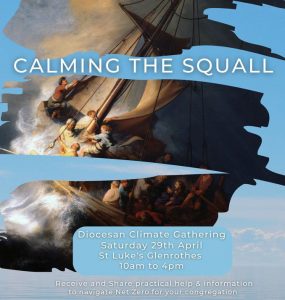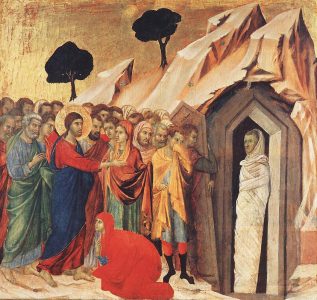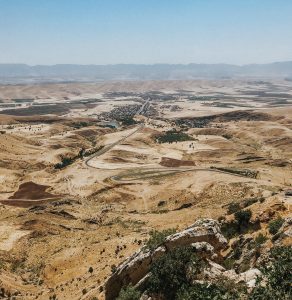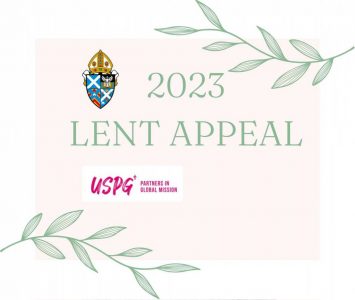Martin Tarr

“Calming the Squall”, a Diocesan Climate Gathering, will be held at St Luke’s Glenrothes (Ninian Quadrant, Glenrothes, KY7 4HP) from 10.00am to 4.00pm on Saturday 29 April. This gathering is to receive and share practical help and information to navigate Net Zero for all congregations. There will be a plenary session, workshops and stalls addressing practical Net Zero implications and inspired by Mark 4.35–41. Tea and coffee will be provided: bring your own lunch or buy it at the nearby Kingdom Centre. Share in closing worship. For further information contact Gerry Dillon.

This is an extract from Rev Sheila Cameron’s sermon on 9 April, Easter Sunday, when she was expounding on John’s account of the resurrection in John 20:1–18:
… It’s Mary Magdalene, forgiven sinner, friend and devoted follower of Jesus, who takes centre stage in John’s resurrection story, and it is to her that Jesus entrusts the message to the community of his followers that he is alive. This is a very poignant encounter. Mary did not expect to see the face of Jesus again; she wept, not expecting consolation, knowing only loss. Her grief was compounded by the loss of Jesus’ body, all that remained of him. Things couldn’t get any worse. Then in the tomb she saw two angels who spoke comforting words of sorts: “Why are you weeping?” Maybe there was better news ahead.
In the ensuing encounter, as Jesus speaks Mary’s name and she recognises him, a profound change takes place in her relationship with him. She accepts with surprising equanimity that she cannot cling to him and must let him go; the important thing is that he is alive, though changed. He is on his way to his Father, and so cannot be with her or the disciples in the same way as before. The new relationship Jesus offers is still one of presence, but now a presence in another dimension that will last for ever.
God’s reassurance is not far off for those who seek him, as Mary Magdalene discovered. God does care about our griefs and longings and asks us to live in faith that our sorrows will be assuaged in him. This very human account of the resurrection invites us to reflect that love comes to maturity after death. We know that love is not limited by mortality; but that there are times in our lives when we can let go and entrust those we love to God. …
Do read the whole of Sheila’s sermon at this link.
This 1835 painting of Christ’s Appearance to Mary Magdalene after the Resurrection by Russian painter Alexander Andreyevich Ivanov (1806–1858) in the State Russian Museum, St Petersburg, is made available via Wikimedia Commons at this link.

This is an extract from Rev Sheila Cameron’s sermon on 26 March, the Fifth Sunday of Lent, when she was expounding on two resurrection passages in Ezekiel 37:1–14 and John 11:1–45:
… what does Jesus’s promise of resurrection mean for us here and now? Whatever our circumstances: whether someone is a young person and still a bit uncertain of their identity, or a so-called ‘mature’ person advanced in years, whether they’re struggling in mid-life with money, career or family issues, or battling with ill health or the loss of physical strength in old age, these words of Jesus, “I am the resurrection and the life,” carried in the heart and recited in faith will bring comfort and restoration and enable each one of us to face the future with confidence.
These are words that have inspired whole nations to seek freedom and human dignity, as well as being most potent in the lives of individual Christians. The idea that we can overcome the flesh, that is, our limited physical existence in a body subject to sin and decay, and live anew, here and now, inspired the movement to liberate the poor from political and economic oppression in South America in the 1970s and 80s. One of the fathers of that movement in the Catholic Church wrote that Paul’s teaching in Romans 8, that setting the mind on the flesh brings “death” while setting the mind on the Spirit brings “life and peace”, combined with Paul’s idea of the church as the body of Christ – makes the Church a very powerful agent of transformation in the lives of poor people and enables them to take charge of their own destinies.
Do read the whole of Sheila’s sermon at this link.
The Raising of Lazarus, painted in Siena by Duccio di Buoninsegna and in the collection of the Kimbell Art Museum in Forth Worth, Texas, is made available by the Web Gallery of Art at this link.

This is how Rev Sheila Cameron finished her sermon on 5 March, the Second Sunday of Lent:
During Lent, let us think about those risky journeys of Abraham and Nicodemus and of Jesus himself, and about what journeying might mean to each of us. What are the comforts you would need to think about renouncing, if you believed God was calling you to take a step into the unknown? These might be material things such as home comforts; or they might be favourite plans that don’t necessarily include God; or they might be attitudes of mind that put self before discipleship. Whichever category your sacrifice comes under, it won’t be comfortable, but you will be listening for a call to a greater purpose beyond that sacrifice. The present may be darkness, but faith keeps us steady and teaches us patience. And the future holds promises beyond our imaginings.
So, as we make our personal journey of discipleship through Lent, let us empty our hearts and minds of all that distracts us, so that we can, in the words of Henri Nouwen, “prepare in the centre of our innermost being the home for the God who wants to dwell in us. Then we can say with St Paul, ‘I live now not with my own life but with the life of Christ who lives in me’ (Galatians 2:20).” And in this we’ll have a safe home while we are still on the way. Amen.
Do read the whole of Sheila’s sermon at this link.
Our picture by Aram Sabah is a slightly cropped version of the one made available on the Unsplash platform.

As it says on the Diocesan website: “The United Society Partners in the Gospel (USPG), as part of this year’s Lent Appeal, encourages us to acknowledge that our neighbours are not just those in our hometowns. Your neighbour is the person that God calls you to love despite your differences. We pray with our Church partners around the world and stand with their mission to support vulnerable people in their local communities. Please join the global Anglican church in transforming lives.
“This year we stand with and pray for our neighbours in Tanzania and Sri Lanka:
- The Church of Tanzania’s Prevention of Mother to Child Transmission of HIV programme
In the Chamwino district of Tanzania almost all women of reproductive age were afraid to go into hospitals. The Church of Tanzania’s prevention programme provides both the practical and medical support needed to prevent the virus being passed on from mothers to their children. Thanks to this programme, babies are being born HIV free, breaking the chain of infection.
- The Church of Ceylon’s response to the economic crisis in Sri Lanka
Sri Lanka is undergoing its worst economic crisis since the country’s independence in 1948. The soaring cost of living caused by food and fuel shortages has caused power cuts, a lack of medicines and the near collapse of the health system in the country.
“Further information on these important programmes and an accompanying Lenten Study Course Who is Our Neighbour?can be downloaded here.
“We have the opportunity, through this appeal, to help the USPG fund the work of our partner churches there and their life-changing programmes.”
St Margaret’s will again be supporting the appeal, and an open-plate collection will be taken on Palm Sunday and Maundy Thursday.